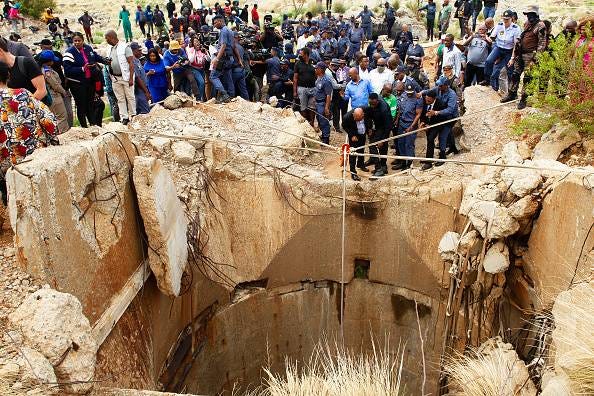🔅 Gold, Guns, and Guts
The Last Guardians of Ancient Traditions & S. Africa Attempts to Extract Illegal Miners

Good Morning from Somaliland!
Gold, Guns, and Guts: The Sahel’s New Mining Showdown
The Scene: You’re a gold-mining executive trying to secure crucial supplies of the gleaming stuff—plus maybe some uranium for those nuclear power deals. You pop over to Mali, Burkina Faso, or Niger, expecting the usual business schmoozing. Surprise! The new military juntas have other ideas, and you might find yourself behind bars, or slapped with a giant tax bill, or even see your product seized on the spot. Fun times, right?
Mali, Burkina Faso, and Niger—the trio informally and more recently known as Africa’s “coup belt”—are rewriting the rules (sometimes literally) to tighten state control over their mineral riches. Why so feisty? After all, these countries are among the world’s poorest, but they boast some of its juiciest gold and uranium deposits. With global commodity prices soaring, the juntas are asking, “Hey, we’ve got the goods—why let foreign miners walk away with all the profit?”
Not-So-Business-As-Usual Tactics
Arrest Warrants Galore
Mali’s courts went so far as to issue a warrant for Barrick Gold’s boss, Mark Bristow, while Australian miner Resolute’s chief was detained for nearly two weeks. Barrick has even reported that authorities started seizing its gold—like, literally carting it away—to enforce new demands.Nationalization, Anyone?
Niger recently stripped French nuclear giant Orano of its mining rights. The regime basically said, “We’re not letting you extract our resources if we’re not on good terms—end of story.” Meanwhile, Burkina Faso told an Aussie miner to pack up and go, pushing them into arbitration.Rewrite the Rulebook
Long-established contracts are under the microscope. Countries are amping up taxes, demanding bigger stakes in mines, and slapping blockades on exports. “Negotiations” can feel more like a staredown over who blinks first.
Why the Hardball?
These juntas have replaced pro-western governments toppled by military coups between 2020 and 2023. They’re fed up with what they see as lopsided deals and decades of Western influence. Under the banner of “sovereignty,” they want more local control and revenue.
Mining Execs’ New Nightmares
Legal Quicksand: Arbitrary lawsuits? Check. Government minders at the mine gate? Double-check.
Surprise Hostage Situations: The CEO might get an unwanted two-week “vacation” courtesy of local authorities.
Production Squeeze: Export shutdowns, new taxes, abrupt “environmental inspections”—the list of “reasons to stall your shipments” is endless.
But Not Everyone’s Losing Out
China’s Ganfeng Lithium just launched a new lithium mine in Mali. The junta’s leader, Assimi Goïta, called Beijing “a strategic and sincere partner.” Translation? Don’t be surprised if more Chinese outfits snap up Sahelian mining rights while Western companies sweat in lockup.
Some Western Miners who’ve played ball by paying bigger royalties and sharing more of the wealth—like B2Gold—seem to be continuing operations, at least for now.
The Big Picture
Companies need these resources: gold prices are near record highs, and uranium is essential for nuclear power. But governments in the Sahel see a golden (pun intended) opportunity to fill their coffers—and assert themselves on the world stage.
Analysts predict these tough tactics are here to stay. Military rulers need quick cash and big wins to solidify power.
South Africa’s Renewed Effort to Extract Starving Illegal Miners

Deep in the shadows of the Buffelsfontein gold mine near Stilfontein, South Africa faces a stark confrontation with the human toll of its illegal mining crisis. After months of deprivation and harrowing tales of survival, the government has launched a mission to extract potentially 1,000+ miners trapped underground.
This comes after a court case, initiated by the sister of one miner, thrust their plight back into the spotlight.
Letters smuggled from 2km underground to the surface paint a haunting picture: emaciated men subsisting on cockroaches, toothpaste, and worse – some reportedly resorting to eating dead bodies. One note claims 109 people have already perished, their bodies wrapped and laid out in underground tunnels.
The Buffelsfontein operation is a grim chapter in South Africa’s ‘zama zama’ epidemic. Illegal miners, numbering around 30,000 operating in many of the 6,000 abandoned mines, scour abandoned shafts for gold in a trade controlled by violent syndicates. They contribute an estimated 10% of the nation’s gold output, but at an unimaginable cost.
Police launched Operation Vala Umgodi in 2023, aiming to "plug the hole" of illegal mining. At Buffelsfontein, a supply blockade—designed to flush miners out—left those underground starving. Sporadic supplies were lowered by December, but accusations abound of hoarded food never reaching the desperate miners.
The current rescue, led by Mines Rescue Services, is slow and perilous. Using a crane-winched cage that can lift six people an hour, the process may take up to 16 days. Nine bodies have already been recovered, and chilling video footage shared by advocacy group Mining Affected Communities United in Action (Macua) shows the dire state of those still underground—emaciated, pleading, and on the edge of survival.
Officials claim many miners stayed underground to avoid arrest, with 1,500 already surfacing from another shaft they’d spent days getting to. However, human rights lawyers argue those in Buffelsfontein had no reasonable way to escape to safer routes. Police promise to investigate allegations of abuse and food hoarding but stress the dangers of hazardous gases and exploitative conditions underground.
This unfolding tragedy highlights the brutal realities of illegal mining in South Africa—a deadly pursuit driven by poverty, desperation, and the glint of gold. For the zama zamas of Buffelsfontein, dreams of fortune have turned into a nightmare, leaving the nation to reckon with its gilded curse.
From Dying Languages to Living History: New Book Chronicles the Last Guardians of Ancient Traditions
Looking for a compelling read this week that takes you from Scandinavia's final night watchman to Peru's last bridge weavers? BBC Travel writer Eliot Stein's new book "Custodians of Wonder" might be just what you're looking for.
In a world where nine languages vanish annually and thousands of villages are on the brink of becoming ghost towns, Stein's book feels less like a travelogue and more like a crucial archive of disappearing wonders. He journeys across the globe to meet the final keepers of ancient traditions – including an extraordinary 800-year-old musical dynasty in West Africa.
You can read an fascinating extract about Balla Kouyaté, a Grammy-winning musician who's also part of a 27-generation line of West African chroniclers, and his quest to preserve an 800-year-old instrument called the Sosso-Bala. The piece explores how this family of musical historians, known as djelis, have kept their culture alive from medieval Mali to modern-day Massachusetts.
Read the extract here.
Food for Thought
“There are three things worth having in this world: courage, common sense and caution.”
— Nigeria Proverb





